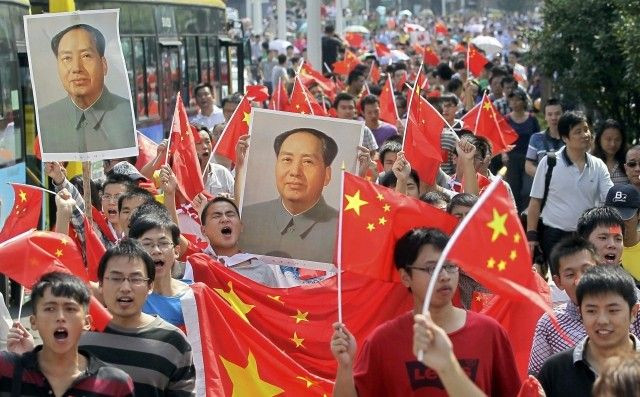Anti-Japanese Protests Erupts Across China; Beijing Raises Trade Threats Over Disputed Islands

In the wake of the rising tensions with Japan over a disputed set of islands in the East China Sea, China has threatened to retaliate with economic measures that would negatively impact the Sino-Japanese trade.
Protests erupted across China in the weekend with angry mob ransacking the Japanese establishments and Japanese cars after Japan confirmed Sept. 10 that it had signed a contract worth 2.05 billion yen ($26 million) to buy three of the five main islands in an archipelago called Senkaku in Japanese and Diaoyu in Chinese, which are currently under private ownership.
Thousands of demonstrators gathered outside the Japanese Embassy in central Beijing Saturday and burned the Japanese flag amid loud cheers and anti-Japanese chants. In the southern city of Guangzhou, crowd illegally entered the luxury Garden Hotel, which is attached to a building that houses the Japanese Consulate, reports said.
Japanese electronics maker Panasonic suspended some of its operations in China following the attacks on two its factories, BBC reported. Canon had also suspended operations at three of its Chinese factories, the report said.
Some 10 Japanese companies in the coastal city of Qingdao, a Japanese investment hub, reported damage, the Wall Street Journal said. A Toyota dealership in China has also been reportedly damaged during the demonstrations.
Japanese Prime Minister Yoshihiko Noda condemned the violence which came ahead of the anniversary of the Mukden Incident -- an event orchestrated by the Japanese military personnel Sept. 18, 1931 as a pretext for invading the northeastern part of China -- Tuesday.
China's Vice Minister of Commerce Jiang Zengwei said Thursday the Japanese government's so-called "purchase" of the Diaoyu Islands would have a negative impact on China-Japan economic and trade ties, China's Xinhua news agency reported.
"Some Japanese enterprises have started to feel the effects already, after the Japanese government carried on its 'nationalization' of the Diaoyu Islands despite strong warnings and opposition voiced from China," Xinhua said referring to reports that the sales of Japanese products have "sharply decreased" since last month.
Toshiyuki Shiga, Nissan's chief operating officer, was cited as saying last week by Xinhua that the ongoing territorial dispute had hurt sales of Japanese cars in China.
Xinhua also reported Chinese tourists and travel agencies cancelling trips to Japan ahead of the upcoming holiday season.
China is Japan's largest trading partner accounting for nearly 20 percent of Japanese exports. Japan's exports to China amounted to $73.54 billion in the first half of the year while imports from China totaled $91.29 billion during the same period, according to Xinhua citing Japanese customs data.
Japan's ambassador-designate to China, Shinichi Nishimiya, died at a hospital Sunday, three days after he had been found unconscious on a Tokyo street, Japanese news reports said.
The cause if Nishimiya's death, who fainted on a street Thursday morning, was not known. The 60-year-old Nishimiya's appointment was approved by the government Tuesday to replace current Japanese Ambassador to China Uichiro Niwa.
Meanwhile, the Chinese Foreign Ministry said Sunday that China submitted information to the U.N. claiming ownership of continental shelf in the East China Sea extending beyond the standard 200 miles (320 kilometers) recognized by the U.N. Convention on the Law of the Sea, the Wall Street Journal reported.
Chinese Assistant Foreign Minister Le Yucheng said Friday that a series of countermeasures released in recent days by the Chinese government would uphold China's sovereignty over the disputed islands.
Le said China had published the base points and baselines of the territorial sea of the islands in accordance with Chinese law on the Territorial Sea and the Contiguous Zone. "This is in line with the U.N. Convention on the Law of the Sea (UNCLOS)," Le was quoted saying by Xinhua.
Delimiting base points and baselines of the territorial sea was a prerequisite to setting a country's jurisdictional waters, Le said.
"By doing so, we can set the territorial sea, the exclusive economic zone and continental shelf in accordance with the UNCLOS, which provides clearer jurisprudential evidence for us to safeguard our sovereignty over the Diaoyu Islands and its jurisdiction of the waters surrounding them," he said.
© Copyright IBTimes 2024. All rights reserved.






















